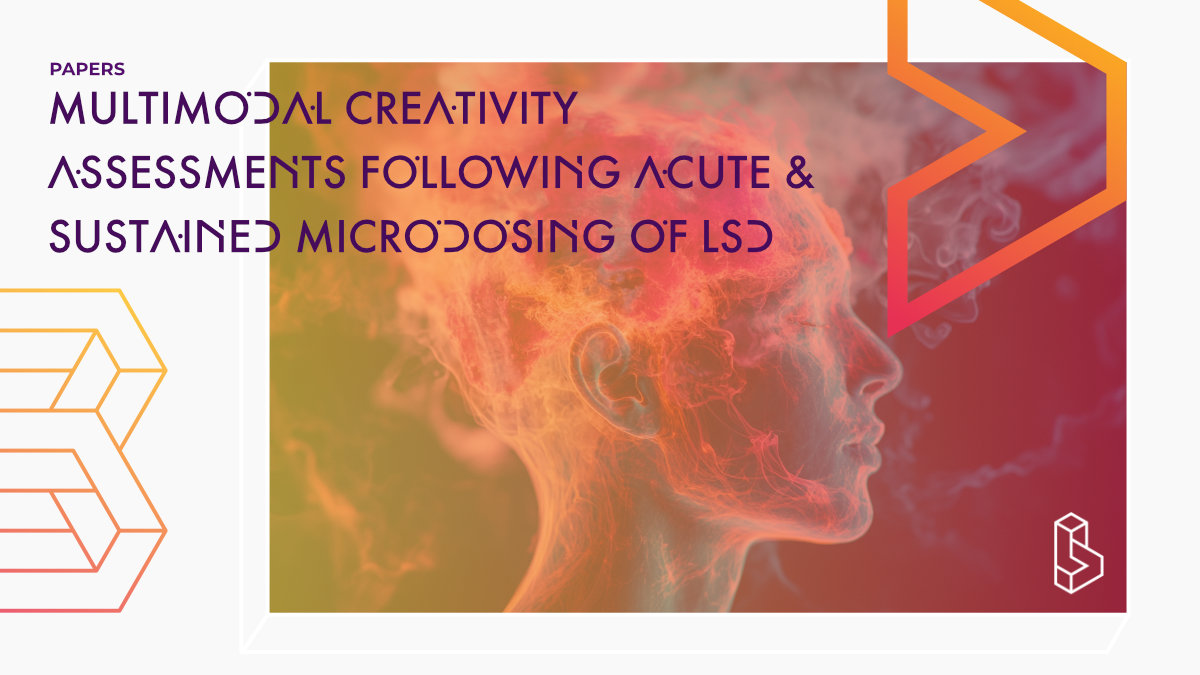This re-analysis of an RCT (n=80) finds no effect of LSD microdosing (10µg, x14) on creativity in healthy adult males. Participants received either LSD or placebo every third day for six weeks, with creativity assessed using multiple tests at baseline, during acute dosing, and after the six-week regimen.
Abstract of Multimodal creativity assessments following acute and sustained microdosing of LSD
“Introduction Enhanced creativity is often cited as an effect of microdosing (taking repeated low doses of a psychedelic drug). There have been recent efforts to validate the reported effects of microdosing, however creativity remains a difficult construct to quantify.
Objectives The current study aimed to assess microdosing’s effects on creativity using a multimodal battery of tests as part of a randomised controlled trial of microdosing lysergic acid diethylamide (LSD).
Methods Eighty healthy adult males were given 10 µg doses of LSD or placebo every third day for six weeks (14 total doses). Creativity tasks were administered at a drug-free baseline session, at a first dosing session during the acute phase of the drug’s effects, and in a drug-free final session following the six-week microdosing regimen. Creativity tasks were the Alternate Uses Test (AUT), Remote Associates Task (RAT), Consensual Assessment Technique (CAT), and an Everyday Problem-Solving Questionnaire (EPSQ).
Results No effect of drug by time was found on the AUT, RAT, CAT, or EPSQ. Baseline vocabulary skill had a significant effect on AUT and RAT scores.
Conclusions Despite participants reporting feeling more creative on dose days, objective measurement found no acute or durable effects of the microdosing protocol on creativity. Possible explanations of these null findings are that laboratory testing conditions may negatively affect ability to detect naturalistic differences in creative performance, the tests available do not capture the facets of creativity that are anecdotally affected by microdosing, or that reported enhancements of creativity are placebo effects.“
Authors: Robin J. Murphy, Rachael L. Sumner, Kate Godfrey, Acima Mabidikama, Reece P. Roberts, Frederick Sundram & Suresh Muthukumaraswamy
Summary of Multimodal creativity assessments following acute and sustained microdosing of LSD
This research article delves into the widely discussed but scientifically underexplored claim that microdosing, the practice of taking very low, sub-hallucinogenic doses of psychedelic drugs, enhances creativity. While anecdotal reports from microdosers frequently cite increased creativity, previous attempts to objectively measure this effect in clinical settings have yielded inconsistent results. This discrepancy between subjective experiences and objective data raises questions about the validity of self-reported creativity enhancements and the challenges inherent in quantifying such a complex cognitive process.
Recognising the need for a more robust investigation, the researchers aimed to rigorously assess the impact of microdosing on creativity. They designed a study employing a diverse range of tests to capture different facets of creativity, hoping to bridge the gap between anecdotal evidence and scientific findings. This multi-faceted approach aimed to provide a more comprehensive understanding of microdosing’s potential effects on creativity.
Defining and Measuring Creativity
Find this paper
https://doi.org/10.1007/s00213-024-06680-z
Open Access | Google Scholar | Backup | 🕊
Cite this paper (APA)
Murphy, R. J., Sumner, R. L., Godfrey, K., Mabidikama, A., Roberts, R. P., Sundram, F., & Muthukumaraswamy, S. (2024). Multimodal creativity assessments following acute and sustained microdosing of lysergic acid diethylamide. Psychopharmacology, 1-15.
Study details
Compounds studied
LSD
Topics studied
Microdosing
Creativity
Study characteristics
Original Re-analysis
Placebo-Controlled
Double-Blind
Randomized
Participants
80
Humans
Compound Details
The psychedelics given at which dose and how many times
LSD 10 μg | 14xLinked Research Papers
Notable research papers that build on or are influenced by this paper
Pharmacokinetics and pharmacodynamics of sublingual microdosed lysergic acid diethylamide in healthy adult volunteersThis re-analysis of a Phase I RCT (n=80) examines the pharmacokinetics (how the body affects a drug) of LSD microdosing (10µg; 14x; 6w) in healthy adult males. The study established a one-compartment pharmacokinetic model showing an elimination half-life of 3.08h, found minimal physiological effects (<15% change in heart rate), noted possible influence of CYP enzymes on drug metabolism, and reported no changes in peripheral BDNF levels.
Modulation of long-term potentiation following microdoses of LSD captured by thalamo-cortical modelling in a randomised, controlled trial
This randomized controlled trial (n=80) investigated the effects of microdosed LSD (10µg; 14x) on neural plasticity using a visual long-term potentiation (LTP) EEG paradigm. Participants received either LSD or placebo and completed the visual LTP paradigm both acutely and after six weeks of repeated microdosing. While event-related potential (ERP) analyses didn't show changes in visually induced LTP, dynamic causal modelling revealed alterations in laminar connectivity in the primary visual cortex, suggesting a more sensitive approach to assessing neural plasticity compared to traditional peak analysis methods.
Acute mood-elevating properties of microdosed LSD in healthy volunteers: a home-administered randomised controlled trial
This placebo-controlled, randomized, naturalistic study (n=80) of repeated microdoses of LSD (10μg, 14x, 6w) finds improved ratings, on dosing days, on creativity, connectedness, energy, and other wellness ratings. Though these transient changes were found, no enduring changes to mood and cognition were observed.
LSD increases sleep duration the night after microdosing
This Phase I RCT (n=80) examined the effects of microdosing LSD (10μcg; 14x; 6w) on sleep in healthy adult male volunteers, with doses self-administered every third day and sleep monitored through a commercially available sleep/activity tracker. The results showed that participants in the LSD group slept an extra 24.3 minutes per night on the night after microdosing compared to the placebo group, with no changes in sleep stages or physical activity.
Linked Clinical Trial
A randomised, double-blind, placebo-controlled trial to study the effects of repeated microdoses of lysergic acid diethylamide (LSD) on creativity and brain activity in healthy adult malesThis randomized, double-blind, placebo-controlled trial (n=80) will study the effects of repeated microdoses of lysergic acid diethylamide (LSD) on creativity and brain activity in healthy adult males. Participants will receive either 10 µg of LSD or a placebo, dissolved in water in 1 ml oral syringes, taken once every three days for a total of 14 doses over a 41-day regimen.

